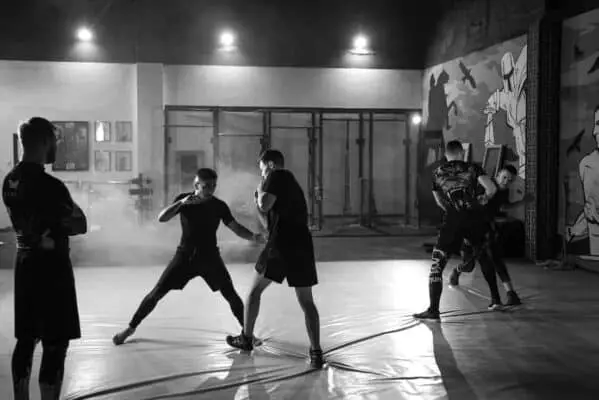
It goes without saying that UFC fighters need to train to the very peak of human fitness. Stamina, speed, technique and conditioning all need to be at their absolute best in order to defeat opponents at the highest level in any combat sport and the world’s most popular mixed martial arts organization is no different.
Long-term damage to the body is a genuine risk that any fighter faces and this risk is amplified if a fighter doesn’t ensure that they are in the best possible shape to dodge strikes, resist submission attempts, and roll with the punches which do land.
That said, there is so much to learn and train if you are a UFC fighter because you have to be prepared to fight against some of the best fighters in the world with different fighting styles. Therefore, on average, how long do UFC fighters train every day?
Lower-ranked UFC fighters who typically have other full-time jobs train anywhere from 4-5 hours per day. In contrast, higher-ranked UFC fighters train 6 hours plus every day because their higher earnings from the UFC allow them the financial freedom to focus solely on training full time.
As you see here, the earning amount affects the fighters’ commitment to how long they can train every day.
So you want to know how much UFC fighters train in more detail, how often, and what training they go through? After reading this article, you will have a pretty good idea of what these UFC fighters go through every day.
How many hours do UFC fighters train a day?
The number of training hours can vary depending on UFC fighters’ rankings because their ranking can dictate how much money they earn, deciding whether they can train full-time or part-time.
In the beginning, many lower-ranked fighters may not earn enough money to sustain a living from fighting in UFC while moving up the ranking. Not earning enough income from fighting means that many low-ranked fighters have to build their training schedules around their full-time jobs to support themselves, their dreams of success, and their families.
Those in this situation may likely train around four hours a day – two hours in the morning, two hours in the evening during the week, and a longer session on a Saturday. Most take at least one day off.
As a general rule, more successful fighters or those who are higher ranked can focus more on fighting, and they will be able to invest around six hours a day into training. For example, Conor McGregor, a very successful UFC fighter, once bragged about starting his day in the gym at about 7 am and not leaving until 1 in the morning, driven by his obsession to perfect his moves learned.
What type of training do UFC fighters go through?
The type of training UFC fighters undergo depends on their style and the disciplines they are grounded. Most successful fighters started as either high-level strikers, such as Muay Thai and kickboxers, or grapplers, such as Brazilian Jiu-Jitsu black belts, sambo champions, or even wrestling Olympians.
That is not to say that more recent additions to the UFC did not come up through the ranks of amateur MMA organizations while practicing MMA as an integrated sport, but rather that many champions started in different combat sports before moving to MMA.

Fighters have to train a multitude of different arts for the cage. For example, great grapplers have to learn how to box and kick, while great strikers have to learn Brazilian Jiu-Jitsu to prepare if they get taken down or learn wrestling to counter grapple those aiming to bring them to the ground.
Many hours are spent practicing technique, and developing stamina through cardio exercises such as sprint running, burpees, swimming, and spent time in sparring as well. Conditioning exercises often involve either calisthenics or striking the body, including using medicine balls to develop the toughness of muscles by the core.
Most fighters will spend 2-6 hours per week either striking or full MMA rule sparring. Even though this will usually be light and technical for the most part, injuries are more likely to occur in sparring than outside of it.
More brutal sparring will occur in fight camp to prepare the fighters for adversaries inside the cage. Brazilian Jiu-Jitsu sparring starting on the knees may be more commonly practiced as it is less likely to cause injuries associated with striking or standing grappling.
Coming up to fights, when UFC fighters need to lose weight, they will often engage in high cardio workouts, dieting, and the use of a sauna or steam rooms to reduce both water content and body fat percentage in the body.
Some fighters will train weights depending on their body type and martial arts style.
How long is a camp before a fight?
Fight camps typically last 6-8 weeks for each fight and typically involve raising the number of training sessions and increasing the intensity of those sessions.
Some fighters may take much longer to prepare, depending on the circumstances. For instance, if their fights get postponed or they have a particularly high-profile fight ahead of them.
How do fighters train every day if they don’t have fights scheduled?
The amount that fighters train every day vastly varies for individual fighters. The majority of fighters will still train in-between fights, primarily to keep on enhancing their skill sets. There is a never-ending amount of techniques to perfect, and while it is possible to develop better cardio and conditioning closer to the fight, giving up all training will usually end in disaster.
Some fighters are known to take it easy on the dieting and will load up on cheeseburgers, beer, and other notorious empty calories in between fights, such as a very popular UFC fighter Paddy Pimblett.
How long do UFC fighters rest after a fight?
Most fighters will take a week or two off training immediately after a fight. They may take longer if they were severely injured and need to let their bodies recover or undergo physio or surgery to repair some or all of the damage sustained. Minimum time periods are also required before they are allowed to re-enter the cage. The chart below shows how long a waiting period is required before medical officials will certify a fighter to fight again.
| Injury | Minimum Time Before Return to the Cage |
| No injury sustained | 7 Days or 168 Hours |
| TKO | 30 Days |
| Choked Unconscious | 30 Days |
| Knock Out | 45 Days |
| Facial Cut | 60 Days |
| Limb or Joint Injury | 30 Days to 120 Days |
| Broken Bone | 180 Days |
RECOMMENDED READING: Do MMA Fighters Get Brain Damage?
How do UFC fighters recover after training?
Various recovery methods are employed to ensure that fighters recover after training or fight night. However, injuries are not uncommon in the sport. Receiving medical attention, surgery, or even implants of metal plates to support the damage done is something many fighters will have to do whether they win or lose their fights.
Healing can take a variety of forms. Fighters get simple massage and manipulation, for instance, to reduce swelling and pain so they can sleep more comfortably and recover quicker. Some fighters also try compression recovery boots to reduce their swelling, while stretching, cryotherapy, and ice baths, can help fix soreness and minor injuries.
When it comes to recovery during training camps, the main focus is typically avoiding overtraining, which can lead to poor performance, irritability, illness, injury, and fatigue. However, some athletes don’t believe overtraining exists and assert that there is only under-recovery.
On rest days, most fighters will do some light exercise – a walk, a bike ride, some yoga, or maybe a dip in the pool. This is because it’s better for recovery to keep the body moving a little bit than to do nothing at all.
A proper diet plays another big part in recovery and is often tailored for fighters to speed up their recovery. For example, fighters take high-quality protein shakes and consume high-quality grass-fed meats to give their bodies essential amino acids to repair and regenerate muscle tissue after hard training.
Natural supplements and maintaining hydration levels also speed up the recovery process.
Lastly, sleep is essential. The body does so much repair and cellular growth when your brain is in REM sleep state.
RECOMMENDED READING: MMA Diet On A Budget To Improve Performance
How often do UFC fighters fight?
On average UFC fighters will fight 2-3 times a year, but those making their way up the ranks may fight as many times as 5 times in a year.
On a side note, MMA fighters on the independent circuit, or fighting in smaller organizations may fight even more than this, but due to the risk involved, this is not advisable.
Conclusion
Being a professional MMA fighter requires a lot of sacrifices – an enormous amount of time spent in the gym, dietary restrictions, the dedication to avoid more hedonistic practices such as drinking and partying.
It may mean time spent away from friends and family, or having to take a second job in order to support the career. That being said, a fighter should know when to rest and recuperate if they want to have a long and successful career like Charles Oliviera, or legends of the sport such as Randy Couture and Dan Severn have all done.
